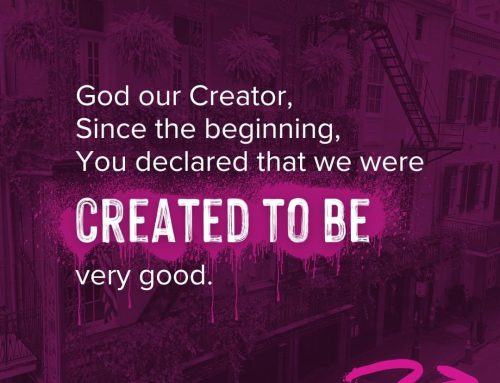Last time I spoke, I had mentioned that we in the office of the bishop of the Oregon Synod have been working hard, clarifying our priorities, examining our resources, and readying ourselves to accompany you more fully as we seek to love and serve God’s beautiful and broken world together in these times.
You’re an amazing synod. The more I’ve traveled to be with you in worship, and meetings, and prayer, and potlucks, the more certain I am that when we are aligned and together, we have everything we need to meet this world’s needs with God’s compassion, integrity, and love.
Today, I’m excited to share more about how connection, compassion, and courageous love will be central to our journey in the next six years. Here are some key ways we are prioritizing our work in the office of the bishop to better walk the way of Jesus with all of you with faithfulness, hope, and courageous love.
First, we’ll be prioritizing congregational health and vitality. As your bishop, this is a key priority for me. It means listening, linking, and resourcing your ministry sites for creative and inspiring mission and ministry. It means clarifying how you might best partner with us. It means thickening relationships with one another and all of our ministry partners across the entire state, so that we can be equipped to be the colorful and diverse tapestry of life that we are called to be in these times.
In our spring Synod Assembly this year, you spoke and we heard you. We plan to create more opportunities. Opportunities for living into our recent Synod Assembly resolutions, more leadership development opportunities for both ordained and lay people, more curated online and in-person resources as you face more and more transitions and more empowerment of your local cluster deans in their ministry with you.
All of this means a few staffing reconfigurations.
Pastor David Eppelsheimer will continue in his work with congregations in transition. His title will change from mobility specialist to bishop’s associate for clergy transition and congregational health. David brings a calm and grounded faith, humility, and humor, and decades of experience, in a wide variety of contexts, to everything he does. I’m excited to share more about what this will mean for you in the months ahead.
These two key changes will help us in Oregon continue to be that community of Christ’s inclusion, justice, and love, and support all of you at the congregational and ministry site level.
Second, alignment for spiritual mission.
This means that we will be prioritizing harmony, flow, and clarity as we seek broader alignment in the work of the Bishop’s Office.
Third bucket, we will be prioritizing our time to support the unfolding church of the future. In light of our deeply held values of mutual accompaniment and wisdom from the margins, we’re putting even more emphasis on preparing for the spiritual community of the future. Where is God calling us to be fresh, innovative, and creative for Christ and Christ’s liberating love?
Pastor Melissa Reed, when she returns from sabbatical in December, will step out of her role as bishop’s associate and start a new role as director of two distinct programs. One of these programs will focus on land liberation, working with you and your congregations out of a resolution we passed over 90% at the Synod Assembly to explore the stories of the land around and under your building. The other program will focus on leadership development for both ordained and lay people as we seek to meet the needs of the church, not of yesterday, but of today and especially tomorrow. In the new role of program director, Melissa will be reporting to Juan Carlos. Her insights, gifts for facilitation, and rich experience with land listening and sacred leadership development will help make these initiatives some of the most unique programs in our denomination. You’ll be hearing more about these upon her return. And she and I are both delighted that her time and energy will be focused in this way.
Saints, despite what is sometimes offered in the national conversation, the way of Jesus is a way of healing, a way of grace, a way of justice, and a way of dignity for all. Every one of our ministries is needed at the table of Christ’s welcome. At this table, all are welcome. And it’s huge, limitless, expansive, and edgeless and ultimately, it’s not ours.
What if we became known for this kind of sacred table setting all across the state and even the nation? Because we know the challenges of this moment are not going away. And before we can meet the challenges of the world, we need to be grounded both in who we are and whose we are. The first step, as Jesus teaches over and over again in scripture, is prayer. Breathing in and with the divine, making sure we’re settled, grounded, and connected enough to be God’s people, on the way, together. And then comes the work and thoughtful alignment for compassion and courageous action.
May we be that, saints.



